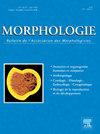Can ChatGPT play a significant role in anatomy education? A scoping review
Q3 Medicine
引用次数: 0
Abstract
Purpose
We performed a scoping review to explore if ChatGPT, an artificial intelligence platform, can play a significant role in anatomy education.
Methods
PubMed, SCOPUS, ERIC and Cochrane databases were searched for articles which included anatomical questions asked to ChatGPT. From each article, we extracted the following data: authors, type of study (qualitative or quantitative), presence or not of comparison of ChatGPT with other platforms or humans, type of questions asked to ChatGPT and evaluation of the answers to these questions.
Results
Nine studies were included. Seven of them were quantitative and two were qualitative. Four studies included comparison of ChatGPT with other platforms or humans, while five studies did not. The performance of ChatGPT was weak. It failed to generate detailed answers, acceptable images and scientifically sound texts. However, it could help students understand anatomy and demonstrate the clinical significance of anatomical information. When it was compared with other platforms, its performance was either worse or not significantly different.
Conclusion
ChatGPT is not yet at an acceptable level to play a significant role in anatomy education. Given that artificial intelligence is constantly evolving, future research may show that ChatGPT will be improved enough to enhance its educational potential.
ChatGPT能否在解剖学教育中发挥重要作用?范围审查。
目的:我们对人工智能平台ChatGPT在解剖学教育中是否发挥重要作用进行了范围综述。方法:检索PubMed、SCOPUS、ERIC和Cochrane数据库中包含ChatGPT解剖问题的文章。从每篇文章中,我们提取了以下数据:作者,研究类型(定性或定量),ChatGPT与其他平台或人类的比较是否存在,ChatGPT提出的问题类型以及对这些问题答案的评价。结果:纳入9项研究。其中7个是定量的,2个是定性的。四项研究包括ChatGPT与其他平台或人类的比较,而五项研究没有。ChatGPT的性能较弱。它无法生成详细的答案、可接受的图像和科学合理的文本。然而,它可以帮助学生了解解剖学,展示解剖学信息的临床意义。当与其他平台进行比较时,它的性能要么更差,要么没有显著差异。结论:ChatGPT在解剖学教育中尚未达到可接受的水平,无法发挥重要作用。鉴于人工智能在不断发展,未来的研究可能会表明,ChatGPT将得到足够的改进,以增强其教育潜力。
本文章由计算机程序翻译,如有差异,请以英文原文为准。
求助全文
约1分钟内获得全文
求助全文
来源期刊

Morphologie
Medicine-Anatomy
CiteScore
2.30
自引率
0.00%
发文量
150
审稿时长
25 days
期刊介绍:
Morphologie est une revue universitaire avec une ouverture médicale qui sa adresse aux enseignants, aux étudiants, aux chercheurs et aux cliniciens en anatomie et en morphologie. Vous y trouverez les développements les plus actuels de votre spécialité, en France comme a international. Le objectif de Morphologie est d?offrir des lectures privilégiées sous forme de revues générales, d?articles originaux, de mises au point didactiques et de revues de la littérature, qui permettront notamment aux enseignants de optimiser leurs cours et aux spécialistes d?enrichir leurs connaissances.
 求助内容:
求助内容: 应助结果提醒方式:
应助结果提醒方式:


